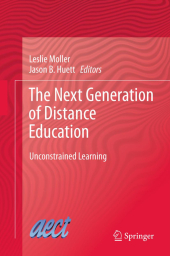 Neuerscheinungen 2014Stand: 2020-02-01 |
Schnellsuche
ISBN/Stichwort/Autor
|
Herderstraße 10
10625 Berlin
Tel.: 030 315 714 16
Fax 030 315 714 14
info@buchspektrum.de |

Jason B. Huett, Leslie Moller
(Beteiligte)
The Next Generation of Distance Education
Unconstrained Learning
Herausgegeben von Moller, Leslie; Huett, Jason B.
2012. 2014. xxvi, 266 S. 235 mm
Verlag/Jahr: SPRINGER, BERLIN; SPRINGER NEW YORK; SPRINGER 2014
ISBN: 1-489-99978-7 (1489999787)
Neue ISBN: 978-1-489-99978-8 (9781489999788)
Preis und Lieferzeit: Bitte klicken
This book identifies research-supported ways to harness the power of new technologies and ideas to improve distance learning. It includes the perspectives of those who are creating, adapting, or evolving new technologies and instructional delivery methods.
The world of education is being radically altered with the change being driven by technology, openness, and unprecedented access to knowledge. Older correspondence-style methods of instructional delivery are passé and "classroom adapted to the web" approaches to learning are often ineffective and do little to harness the transformational potential of technology. E-Learning scenarios, mobile technologies, communication and information access, and personal learning environments are becoming mainstream and, as a result, control of the learning process is shifting away from institutions and into the hands of learners. This volumes promotes a forward-thinking agenda for research and scholarship that highlights new ideas, deep insights, and novel approaches to "unconstrained" learning.
-1. Guiding principles of the next generation of learning at a distance.-2. The future of distance learning technology: It´s not about the technology, and it´s not about the distance.-3.An analysis of success and failures: Planning the foundation for the next generation of distance education.-4. Rethinking design and learning processes.-5. Needs assessment: Identifying teachers´ expectations and perceptions of an online P-6 engineering professional development program.-6. Collaborative problem-solving in virtual environments: Effect of social interaction, social presence and sociability on critical thinking.-7. Using the community of inquiry framework to inform effective instructional design.-8. The design critique as a model for distributed learning.-9. Data, information, knowledge, wisdom: A revised model for agents-based knowledge management systems.-10. Higher education and post-industrial society: New ideas about teaching, learning, and technology.-11. CyGaMEs: A full-service instructional design model harnessing game-based technologies for learning and assessment.-12. Learning-communication interfaces model: Implications to virtual learning.-13. The influence of backchannel communication on cognitive load.-14. The next generation of research in distance and online learning: Unconstrained by comparisons to classroom instruction.-15. The effect of delivery method of instructional materials to meet learning goals and objectives in online and open learning environments.-16. Engaging learners in collaborative authentic learning activities.-17. Learning communities.


